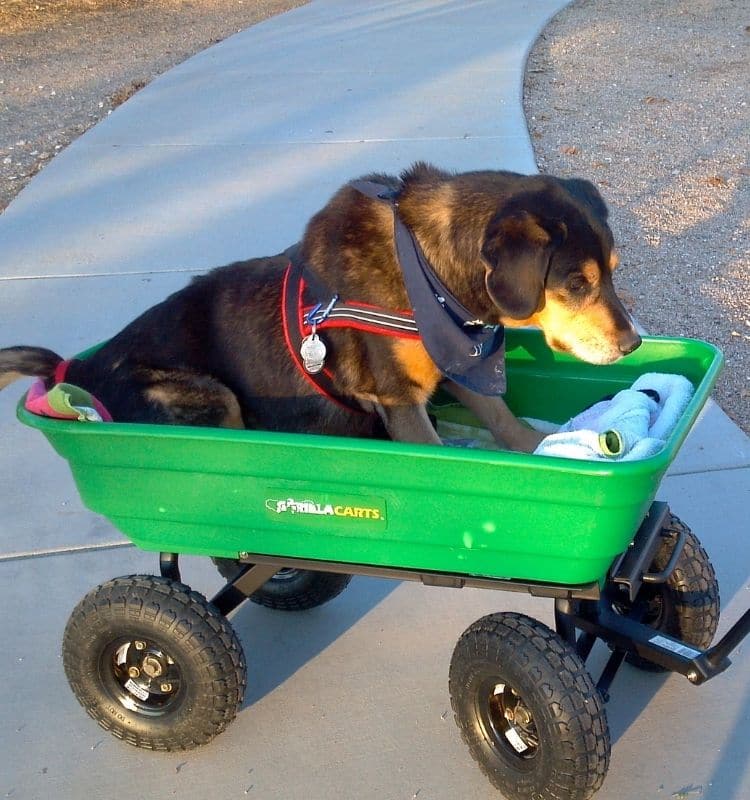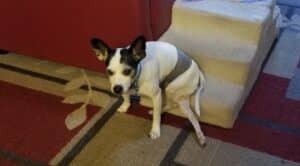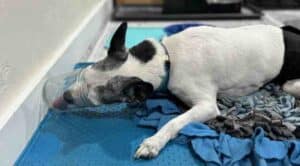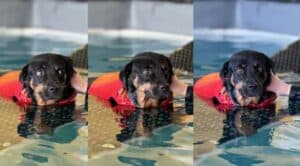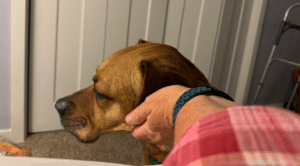I work with a lot of senior dogs and it’s a question I’ve heard many times. And I always answer the same way, “He’ll tell you when he’s ready. Trust your dog.” Intellectually, I know it’s good advice, but when it’s your own dog, it’s hard to trust.
As expected, Travis taught me to trust him one last time: he told us when he was ready. I came home from my last appointment on Friday, February 3rd, ready to spend some time with the boys. It was a beautiful Tucson winter day so I thought a walk would be a nice way start to the weekend. Harley was VERY excited at the prospect of an afternoon constitutional so I decided to take him by himself for a quick spin through the park. With Travis back at the house, Harley could walk at his pace and sniff everything that caught his olfactory fancy.
We returned to the house to collect Travis for a short walk down the street. After some discussion (OK, I was thinking out loud), I decided to leave Harley at home and just take Trav for a short shuffle past a few houses. He seemed tired and I didn’t think he’d want to do much more. I hooked up his harness and led him out the gate. We crossed the street and he sniffed his favorite boulder. Then, he stopped. He set his heels. He didn’t want to go any farther. Confused, I led him back to the yard and loaded him into his little green wagon, purchased just for his transportation convenience. We made it past one house before he tried to jump out. I lifted him from the wagon and we slowly walked home. I could almost feel my unconscious mind tapping on the back of my head. Pay attention.
That night, Travis ate with his normal gusto, but his back end sank as he stood at his feeding stand. His back legs were like a forklift, slowly lowering its load to the ground. I thought his feet might be slipping on the tile floor, so I stood with my hand under his pelvis and held him up while he finished his meal. As usual, he shuffled over to his bed for a post-dinner nap.
His bedtime potty break brought more of the same. As his hips sank, so too did our hearts. The time was close. His body was giving out. We discussed our options including where it would happen. Based on previous blood draws, we knew Travis was a difficult stick. After numerous tries in leg veins, the technicians resorted to the carotid artery in his neck for blood samples. The final stick would be the most important and we didn’t want any complications so we decided that his euthanasia would happen at the clinic. The word euthanasia comes from the Greek, meaning “good or easy death”, and that’s what we wanted for Travis. We didn’t know when, but we were prepared to give him the smoothest passing we could.
The when came sooner than we thought. At 4AM, he whistled to go out. He wasn’t able to control his rear limbs well enough to get to the door on his own so we quickly ripped open the Velcro on his belly band and supported his rear end. We got him outside but it was like the wheelbarrow races you run on Field Day in elementary school. Except my partner was a 60-pound blind dog who desperately needed to relieve himself and couldn’t decide where or how to do it.
He finally did all he needed to do after leading me through the bushes and under a low-hanging branch. I had twigs in my hair and Travis’ deposit on the bottom of my Wicked Good slipper, but we made it back to the door. I kicked off my slippers and led him back in. He told me he was too tired to make it back to the bedroom, so we helped him back his favorite bed in the living room. We stumbled back to bed, filled with dread at what the morning would bring.
Three hours later I heard him struggling in the living room. He had tried to make his way to the door and had slipped on the hardwood. He was spread-eagle and trying to get his legs under him. I was kicking myself for not sleeping on the couch to be near him as we helped him outside to pee, hoisting his rear end with his belly band. We thought it was time. He was exhausted. We could see it in his eyes. We brought him back to his bed and we decided we should bring him a rawhide to chew on while we made the phone call. He’d spent the last two weeks happily chewing on this rawhide. We told ourselves if he worked himself into a tizzy and died chewing on that nasty thing, he’d die a happy dog.
That didn’t happen. When we offered him his favorite rawhide, he turned away. If we needed a clear indication that he was ready, he’d just given it to us. We both drew in a sharp breath and bowed our heads. It was time and there was no question.
Kathy and I believe it’s important for the surviving members of the pack (two-and four- legged) to be present when a pack member passes. Although they’d spent only about 16 months together, Travis and Harley had built a relationship. We wanted there to be no question in Harley’s mind about where Travis was or what had happened to him. We could never know if he understood what was happening, but he would have the opportunity to be part of it and interpret the event at his level.
Within twenty minutes, we’d loaded Harley in the car and were preparing to move Travis. He was unable to support any of his weight so I lifted him from his bed and started to carry him to the car. That’s when I felt the warm liquid soaking my thigh and running down my right leg. I was carrying him with one arm under his chest and the other apparently under his bladder. The pressure was more than he could handle and his bladder released its full contents. But worse, he started to cough and bark like a seal by the time we reached the car. Much of his weight was resting on his chest and the fluid his pleural cavity was compressing his lungs. I got him into the back of the Subaru and onto his side. That stopped the coughing and he seemed more relaxed. Kathy convinced me that wearing urine-soaked pants wasn’t the best plan, so I ran back in to change. I’ve never undressed and redressed faster in my life.
With Harley and Travis loaded up, we set off to the clinic. Harley was careful not to step on Travis. He stayed near the front of the cargo bay, giving Travis all the room he needed. Kathy watched Travis for signs of discomfort or distress, but he lay quietly as we drove those long three miles.
When we arrived at the clinic, Tina, the practice manager and Dr. Ireland’s wife, met us at the back door. They had readied the business office for the procedure; they knew we’d want some place private and quiet for Travis. They also knew we’d have Harley with us and didn’t want him to associate Travis’ death with any of the treatment rooms that he would visit again. We appreciated the forethought.
We carried him gently into the office and laid him on the bed covered with a soft striped blanket. Dr. Ireland was prepared with the two syringes, one filled with butorphanol for sedation and the other with pentobarbital, the drug that would eventually stop his heart and end his life. As we encircled Travis on the round bed, Harley searched for his place. He circled the group a few times and and finally settled behind Travis, facing me.
Dr. Ireland gave him the first injection and as Travis began to feel its effects, we caressed him and told him how much he meant to us. I thanked him for being my muse. Kathy hugged him and told him she loved him. Harley sniffed him, lay down behind his bed and put his head down on his long, extended forelimbs.
Dr. Ireland asked if we were ready and we agreed that Travis was ready. As Tina softly squeezed a spot just above Travis’s ankle to build up pressure in the vein, Dr. Ireland adeptly inserted the needle into the budging vein and slowly withdrew a small amount of blood. He’d hit the mark on the first try. Our wish had been granted. This would be an uncomplicated, pain-free passing for our stalwart old hound. Dr. Ireland depressed the plunger. He was gone in seconds.
We cried. We hugged him. Harley got up and sniffed him and in true dog fashion, was ready to move forward. He circled the three of us, checking our faces for tears in a slow, methodical manner. Tina and Dr. Ireland had left us to grieve in peace at this point. We spent another fifteen minutes with Travis, rubbing his plush fur, stroking his soft ears, kissing the black spot between his eyes. We soaked in his love one last time.
Kathy and I knew he’d left us and what remained was just his physical form. There was no need for us to hold vigil for an extended period. We knew we still had work left to do for Travis. We let the Irelands know we were finished with this part of our journey and they helped us carry Travis back to the car. We placed him the same position, on his side facing the back of the car. As he had for the drive down, Harley was careful not to step on Travis. He sniffed him again and seemed to know that Travis was gone. He showed no fear or anxiety, but was uninterested in Travis’s body.
We drove in silence to the pet cemetery where the undertaker was ready and waiting for us. Darla asked us to back the car up to a roll-top door where a cart was waiting. We opened the back hatch and looked at Travis one more time. I ran my hand across that soft fur again, trying to burn that feeling into the palms of my hands. We lifted him out of the car and placed him in a cream-colored coffin-like container. He fit perfectly. The Ireland’s had given us the blanket Travis lay on during his final moments and we left that with him. What is it about humans wanting to provide creature comforts after a being passes? It was important to us at the time, so the blanket stayed with him. Darla took Travis inside and we walked around to the front of the building and entered the lobby area. Travis was waiting for us in the alcove.
I went to him one last time. I was amazed that he was still warm to the touch. Travis had always run hot, but I was amazed. Thankfully, I’m not well-versed in the physiology of death. His warmth was eerie and comforting at the same time.
Harley had been a perfect gentleman during this entire episode, but the birds, the cat and the smell of a new place drove him over the edge. Darla has an ancient cat named Clara. When we entered the lobby I thought she was the product of very good taxidermy, curled up on a bench in the corner. Harley couldn’t tell either, but his nose told him that cat was alive. But every lunge and bark told his eyes otherwise. She didn’t even twitch an ear. Oh the confusion! Then the birds really started their chorus of chatter. I thought his head was going to explode. He had to see those birds! Eighty-five pounds of determination and pent-up energy is nearly impossible to control, but I managed to get him outside before he crashed the cages and got a quick snack.
At a time like this, I really wanted Harley to ignore his primal urges and stay with me. Looking back, that was unrealistic and frankly, a bit selfish. His world doesn’t stop because I’m mourning a loss. He has needs and desires, no matter my emotional state.
While I wrangled Harley, Kathy attended to the details. What kind of cremation? (private- only Travis) Would we need an urn? (no, we planned on sprinkling his ashes) How would the label on the sealed container read? (“Loved by Kathy, Kate, Harley, Kallie, and Dani”) Did we want him cremated in his collar? (yes, he’d had it for many years and it represented the healthy Travis) Did we want a paw print? (yes, I loved those smelly paws) The list went on.
When she emerged from the building, Kathy was composed but exhausted. It was just 9:00 a.m. and we’d already helped Travis’s spirit to The Bridge and prepared his body to return to ashes and dust. It had been both a long and a short six months since his blindness and cancer diagnosis. We were tired, sad and emotionally drained. And yet, there was a crisp lightness in the air. A weight had been lifted. I recognized the feeling from the evening we sent Kallie, our 18-year-old cat, to The Bridge. While Kathy and I were providing the best care possible, we didn’t feel the weight of the responsibility, the pressure of dependency. Only after the yoke was removed did I realize the price I’d paid. And I would (and will) gladly pay the toll again.

